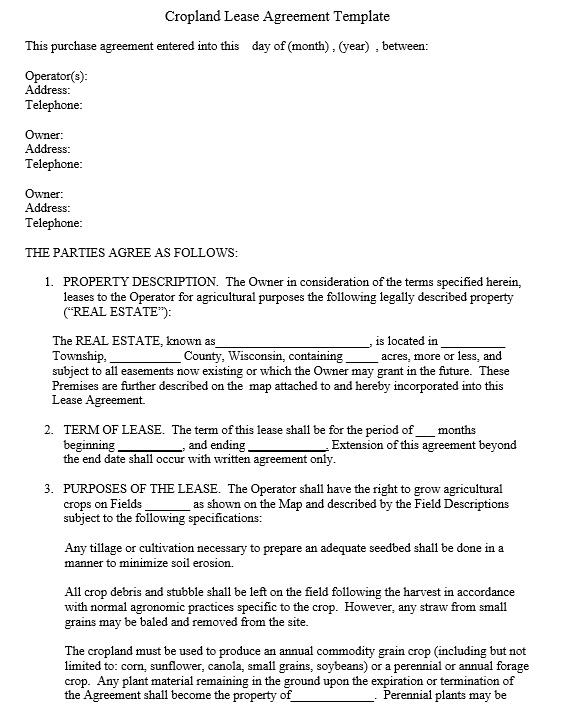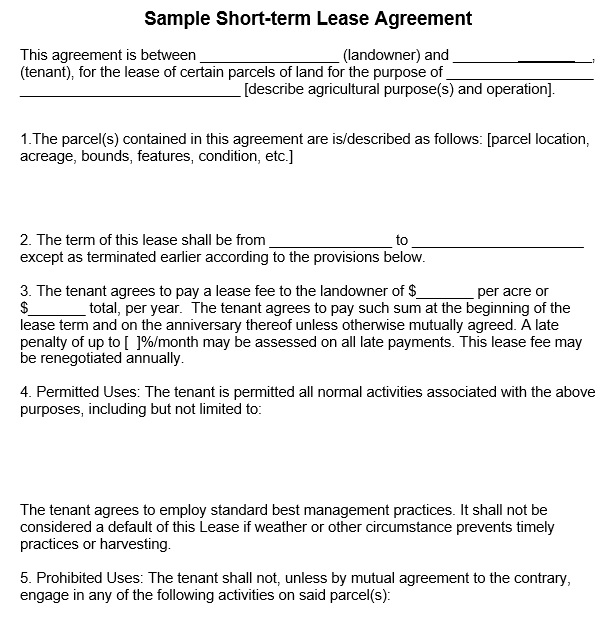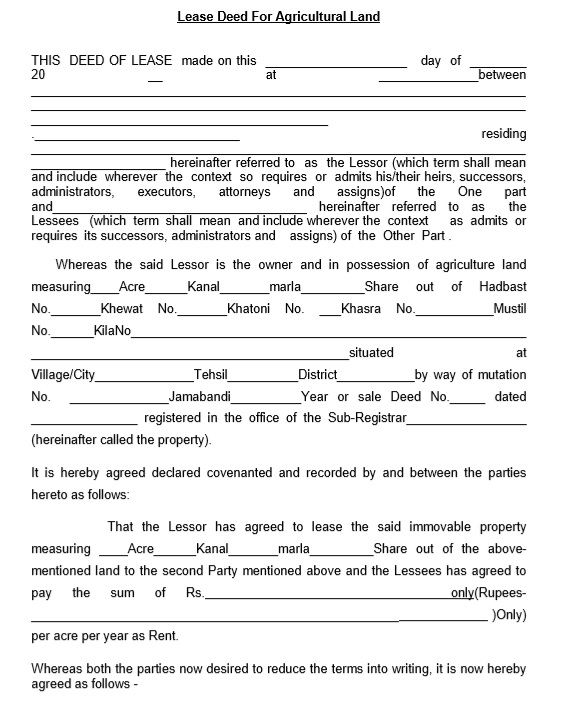In order to ensure that your farm will stay productive when you hand it over to any tenant, you are required to have an agreement with the tenant which is called a professional farm lease agreement. You can list down all the expectations that a tenant and landlord hold regarding this agreement. The obligations of both tenant and landlord are also mentioned in this agreement. You can use this document if you are going to lease your own land to the tenant or when you want to rent farmland from a farmer. You can also explore our complete collection of Free Agreement Templates as well.
Before leasing your land, it is important to write all the terms but it should not be too complicated. Oral lease agreements are also used in many places however; the writing lease agreements have more value. The written agreement also ensures that both parties have completely understood the terms of the lease and will not deviate from these terms. Suppose you are a farmer and a tenant wants to grow his crops on your land, in this case, you will be required to prepare the lease agreement. There are some farm-specific terms and conditions which should be added to the agreement. Such terms include proper maintenance of the soil or land of the farm etc.
Contents
Key Elements of Farm Land Lease Agreements
The lease agreement can work for several years. A lease agreement should minimally contain the following:
- The names of both the landlord and tenant between whom the agreement is going to be signed. In this way, both will be identified.
- The identification of property should also be mentioned.
- The end and start dates of the lease agreement. The lease agreement can be short-term and long-term.
- Fee of the lease
- Signature of both the landlord and tenant.
Before signing this agreement, both parties discuss the nature of the farming business, anticipated problems, the suitable times when they can easily contact each other, expected working hours, plans for improvement, etc. Along with the start and end date of the lease agreement, the document should also tell the conditions for renewal and extension of the agreement. The payment of the lease must also be specified in the agreement even if there is little or no cost. Whoever will be responsible for the utility cost will also be specified in the agreement. If there is any restriction from the landlord for example if he restricts the tenant from searching the land for mineral deposits, then it should also be mentioned in the lease in clear words.
Any maintenance and repair can be kept under the responsibility of the tenant. All the routine maintenance that is required to keep things in order is also kept under the responsibility of the tenant. The landlord will be responsible for the roofing, water supply system, water waste system, and heating and ventilating system. The lease agreement also contains other advice that can be considered for capital improvement. The cases in which the lease agreement will be terminated are also written in the lease.
Free Farm Land Lease Agreement Templates {Exclusive}
Here are previews and download links for these Farm Land Lease Agreement Templates in MS Word format.






More Free Farm Land Lease Agreements
Here is a preview of This First Sample Professional Farm Land Lease Agreement Template created using MS Word,
Source: farmdoc.illinois.edu
Here is a preview of another Sample Professional Farm Land Lease Agreement Template created using MS Word,
Here is a preview of another Sample Professional Farm Land Lease Agreement Template created using MS Word,
Source: bayfield.uwex.edu
Here is a preview of another Sample Professional Farm Land Lease Agreement Template created using MS Word,
Here is a preview of another Sample Professional Farm Land Lease Agreement Template created using MS Word,
Source: fillmoreswcd.org
Here is a preview of another Sample Professional Farm Land Lease Agreement Template created using MS Word,
Source: msu.edu
Here is a preview of another Sample Professional Farm Land Lease Agreement Template created using MS Word,
Source: ifa.ie
Here is a preview of another Sample Professional Farm Land Lease Agreement Template created using MS Word,
Source: gov.mb.ca
Here is a preview of another Sample Professional Farm Land Lease Agreement Template in PDF Format,
Source: extension.psu.edu
Here is a preview of another Sample Professional Farm Land Lease Agreement Template in PDF Format,
Source: uvm.edu
Here is a preview of another Sample Professional Farm Land Lease Agreement Template in PDF Format,
Source: jamabandi.nic.in
Here is a preview of another Sample Professional Farm Land Lease Agreement Template in PDF Format,
Source: californiafarmlink.org
Types of Farm Land Lease Agreements
There are several types of farmland lease agreements that define the relationship between landowners and tenants. They outline how the land is used, what rights each party has, and how income and expenses are shared. Here are the main types:
1. Cash Rent Lease Agreement
The tenant under a cash rent lease agreement has to give the owner of the land a static sum as rent, typically yearly no matter what the farm produces or earns. In effect, most of the financial risks and rewards are carried by the tenant, whereas the landowner only enjoys a stable income.
In a crop share lease usually is where usually production from the farm is shared by both farmer and landowner, these parties receive money sold via grown crops split in various proportions according to agreements made beforehand. For instance, a farmer may give an owner 1/3 part of the yield while he will take care of the remaining part himself. Profit division includes the cost of seeds or fertilizer depending on the agreement reached. Both parties assume equal risks and benefits for the farm since productivity cannot be guaranteed.
3. Flexible Lease Agreement
A flexible lease is a lease where the amount of rent paid may change, or be adjusted, depending on the success of the farm. The agreement provides for a lower minimum rental fee, while the tenant can invest additional sums in case commodity rates fluctuate or at the time of harvest when yield levels are high. This pact considers changes that crop yields and market prices could undergo together with sharing associated positive or negative financial outcomes.
4. Custom Farming Lease Agreement
In patterned tillage mores, the landlord pays to have a crew or company complete given activities such as planting, taking care, and gathering produce. And farmer retains ownership of them but also takes all existing risks while using personal funds to pay for the job performed.
5. Pasture Lease Agreement
It’s the kind of lease agreement that considers grazing animals on a farmer’s field. This person who has rented the plot has a right to bring his/her cattle to feed and occupy space in return for money, while certain conditions regarding animal husbandry, and fence repair among others are always mentioned therein.
In the same way as a crop share lease, the arrangement involves in livestock production shared between landowner and tenant where expenses are shared by both parties with also equal sharing of income realized on sale of animals by them.
7. Grain Bin Lease Agreement
For this specific kind of leasing, landlords rent grain storage facilities (known as grain bins) to tenants. Tenant will then make use of these storage buildings to store not only cereals already harvested, but also awaiting disposal. In general, the terms of lease agreement revolve around rental charges, storage maintenance, and responsibility of owner to harvest the wheat store.
Each type of farmland lease agreement varies based on the risks, rewards, and responsibilities assigned to the landowner and tenant. Selecting the right agreement depends on the specific goals of both parties and the characteristics of the farmland.













